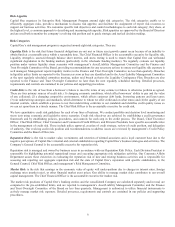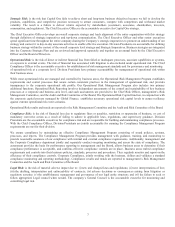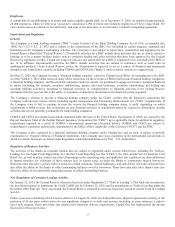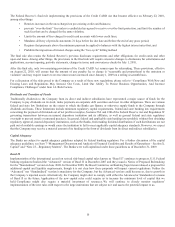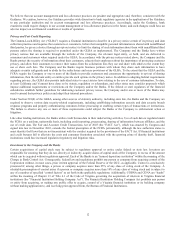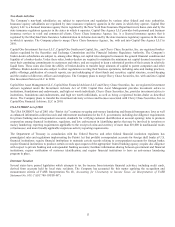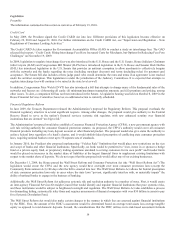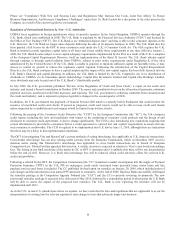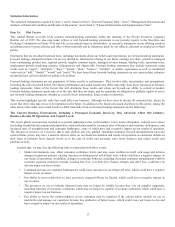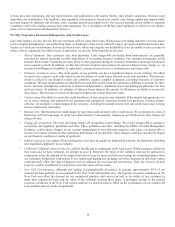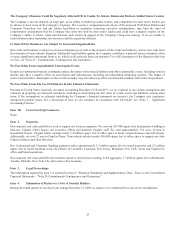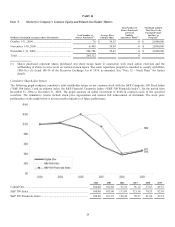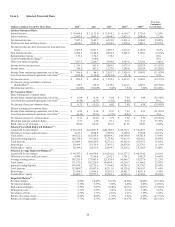Capital One 2009 Annual Report Download - page 29
Download and view the complete annual report
Please find page 29 of the 2009 Capital One annual report below. You can navigate through the pages in the report by either clicking on the pages listed below, or by using the keyword search tool below to find specific information within the annual report. 16
Please see “Compliance With New and Existing Laws and Regulations May Increase Our Costs, Limit Our Ability To Pursue
Business Opportunities, And Increase Compliance Challenges” under Item 1A. Risk Factors for a discussion of the risks posed to the
Company as a result of the current legislative environment.
Regulation of International Business by Non—U.S. Authorities
COBNA faces regulation in foreign jurisdictions where it currently operates. In the United Kingdom, COBNA operates through the
U.K. Bank, which was established in 2000. The U.K. Bank is regulated by the Financial Services Authority (“FSA”) and licensed by
the Office of Fair Trading (“OFT”). The U.K. Bank is an “authorized deposit taker” and thus is able to take consumer deposits in the
U.K. However, the U.K Bank no longer takes deposits following the sale of its deposits business in 2009. The U.K. Bank also has
been granted a full license by the OFT to issue consumer credit under the U.K.’s Consumer Credit Act. The FSA requires the U.K.
Bank to maintain certain regulatory capital ratios at all times and it may modify those requirements at any time. Effective January 1,
2008, the U.K. Bank became subject to new capital adequacy requirements implemented by the FSA as a result of the U.K.’s adoption
of the European Capital Requirements Directive, itself an implementation of the Basel II Accord. The U.K. Bank obtains capital
through earnings or through capital infusion from COBNA, subject to prior notice requirements under Regulation K of the rules
administered by the Federal Reserve. If the U.K. Bank is unable to generate or maintain sufficient capital on favorable terms, it may
choose to restrict its growth to reduce the regulatory capital required. Following the introduction of the Capital Requirements
Directive, the U.K. Bank continues to have a capital surplus and the impact of the new capital regime has been fully factored into the
U.K. Bank’s financial and capital planning. In addition, the U.K. Bank is limited by the U.K. Companies Act in its distribution of
dividends to COBNA via its immediate parent undertakings, Capital One Investment Limited and Capital One Holdings Limited,
since dividends may only be paid out of the U.K. Bank’s “distributable profits.”
In July 2009, the U.K. government published “Review of the Regulation of Credit and Store Cards,” a report on the credit card
industry, and issued a formal consultation in October 2009. The report and consultation focus on the allocation of payments, minimum
payment increases, unsolicited credit limit increases, and repricing. The U.K. government is soliciting comments from consumers and
the credit card industry, and is expected to propose legislative changes in the second quarter of 2010.
In addition, the U.K. government has proposed a Financial Services Bill which is currently before Parliament that would restrict the
issuance of unsolicited credit card checks. If passed as proposed, credit card issuers would not be able to issue credit card checks
unless requested by a cardholder and each request would be limited to up to three checks.
Following the passing of the Consumer Credit Directive (the “CCD”) by the European Commission (the “EC”), the U.K consumer
credit regime, including the laws and regulations with respect to the marketing of consumer credit products and the design of and
disclosure in consumer credit agreements, is due to change significantly. The CCD is also introducing new regulations requiring that
certain information be provided to consumers before a credit agreement is entered into and explicit requirements to ensure that any
such consumer is creditworthy. The CCD is required to be implemented into U.K law by June 11, 2010, although there are indications
that there may be a delay in this implementation timeframe.
The OFT is investigating Visa and MasterCard’s current methods of setting interchange fees applicable to U.K. domestic transactions.
Cross-border interchange fees are also coming under scrutiny from the European Commission, which in December 2007 issued a
decision notice stating that MasterCard’s interchange fees applicable to cross border transactions are in breach of European
Competition Law. MasterCard has appealed this decision. A similar decision is expected in relation to Visa’s cross border interchange
fees. The timing of any final resolution of the matter by EC or OFT is uncertain and it is unlikely that there will be any determination
before the end of 2011. However, it is likely that interchange fees will be reduced, which could adversely affect the yield on U.K.
credit card portfolios.
Following a referral by the OFT, the Competition Commission (the “CC”) launched a market investigation into the supply of Payment
Protection Insurance (“PPI”) in the U.K. PPI on mortgages, credit cards, unsecured loans (personal loans, motor loans and hire
purchase) and secured loans is included. The CC published its final report on remedies on January 29, 2009, which included point of
sale changes and the introduction of an annual PPI statement to customers. At the end of 2009, Barclays Bank successfully challenged
the remedies package at the Competition Appeals Tribunal (the “CAT”) and the CC is currently revisiting its proposals. The new
provisional remedies package is expected to be delivered in May 2010, followed by a consultation period at which point the U.K Bank
will be able to assess the impact of the proposed new remedies. The U.K. Bank is now expecting the remedies will not be
implemented until 2011.
As in the U.S., in non-U.S. jurisdictions where we operate, we face a risk that the laws and regulations that are applicable to us (or the
interpretations of existing laws by relevant regulators) may change in ways that adversely impact our business.


